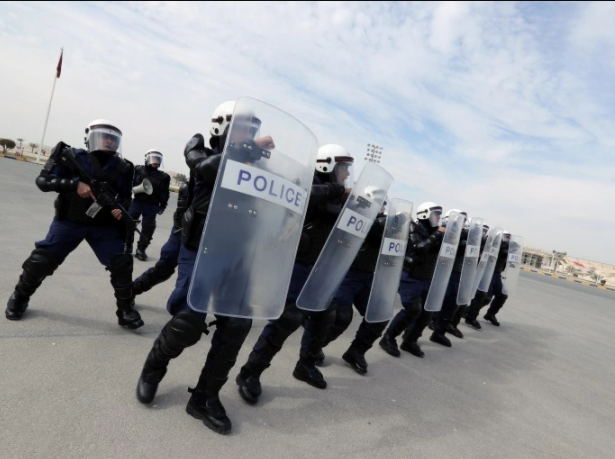ADHRB remains deeply concerned about the continued systematic suppression of dissent in Bahrain. This occurs through the reduction of freedom of expression and social media usage of individuals, and has pervaded the legal system by way of the Press and Media Bill drafted by the Cabinet of Bahrain in 2019. This bill was drafted to modify the Press Law of 2002, and introduces the harmful concept of “social media misuse” and tougher penalties when the law is breached.
“Social media misuse” is defined as using social media to threaten community peace, cause division, and weaken national unity. This broad definition serves as a ploy for the state-sponsored pattern of systematic suppression of individuals who disapprove of the government. To do so, the bill focuses particularly on crimes of defamation, insult, spreading rumors, and damaging individuals, bodies, entities, and state institutions.
This bill targets independent users of social networking sites––going so far as to criminalize tweets and other activities on social media platforms––as well as journalists and directors of independent newspapers. For example, Al-Wasat, the only independent newspaper in Bahrain according to the Bahrain Independent Commission of Inquiry (BICI), was forced to close in 2017. Other newspapers have been similarly targeted and forced to shut down, pay large fines, and, in some cases, employees have been forced to serve time in prison for the sole reason of having shared critical views on the government.
On 30 May 2019, the authorities texted all registered Bahraini cell phone numbers with the threat of retaliation against anyone who follows, on social media platforms, what the authorities defined as “pro-terrorism accounts,” including accounts “which are biased or incite discord.” In January 2020, the Department of Cybercrime summoned several Twitter users because of the publications of tweets which the MoI declared could “harm the general order.” The Ministry of Interior (MoI) then issued a statement discouraging social media users from interacting with social media accounts that violate “public order” in Bahrain and further threatening any such users with legal action.
The criminalization of tweets and social media activities affect a concerning number of human rights activists, many of whom have been targeted by the authorities for their activities on Twitter. Among them, Jassim al-Abbas, the historian and author of the blog “Years of al-Jareesh,” was convicted in January 2020 on charges of using his social media account to spread false information.
Similarly, the renowned human rights lawyers Abdullah Hashim and Abdullah al-Shamlawi were convicted for their usage of social media platforms, in May 2019 and March 2020, respectively. For Mr. Hashim’s publication of eight tweets between May 2017 and April 2019, in which he accused the Bahraini government of corruption, he was accused of sharing fake news. Mr. Al-Shamlawi was charged on the basis of two tweets sharing critical views on practices related to Ashura, the most important date in the Shia religious calendar. He was further accused of voluntarily using telecommunication devices to cause an inconvenience to others because of a tweet posted in 2018; in this tweet, he mistakenly claimed information to be true that was later found to be incorrect. The Bahraini Court of Appeal issued a verdict against Mr. Al-Shamlawi, sentencing him to several months in prison. The sentence was suspended upon payment of bail.
Furthermore, although Bahrain released 1,486 prisoners in March 2020 due to the health risk posed by COVID-19, this excluded the hundreds of opposition leaders, activists, journalists, and human rights defenders––many of whom are aging or have pre-existing medical conditions that put them at higher risk if exposed to the virus. Many of these individuals were imprisoned on charges related to freedom of expression or political opinion, including opposition leader Hasan Mushaima, prominent human rights defender Abdulhadi al-Khawaja, and Bahrain’s last female political prisoner Zakeya Al Barboori.
Moreover, the Press and Media Bill is in violation of Article 19(2) of the International Covenant on Civil and Political Rights (ICCPR), which Bahrain ratified in 2006. Article 19(2) explicitly states that “Everyone shall have the right to freedom of expression…to seek, receive and impart information and ideas of all kinds, regardless of frontiers, either orally, in writing or in print, in the form of art, or through any other media of his choice.” The passing of the Press and Media Bill of 2019 shows the extent to which Bahrain ignored the numerous recommendations calling for compliance with the ICCPR which States made during the Third Cycle of the Universal Periodic Review in 2018. Bahrain’s continued suppression of dissent and quashing of space for freedom of expression is wholly unacceptable and should be seen as a violation of its international treaty obligations.
February 14 will mark 10 years since pro-democracy protesters bravely took to the streets calling for change. Thousands risked their lives or their livelihoods to fight for the implementation of their basic human rights, and the consequences they have suffered since are undeniably alarming for any individual or State that wishes to promote human rights globally. ADHRB calls on the international community to publicly raise the issue of freedom of expression in Bahrain. Bahrain must end both its de jure and de facto persecution of human rights defenders, dissidents, and users of social media by releasing all political prisoners and amending its laws to comply with Article 19(2) of the ICCPR.





